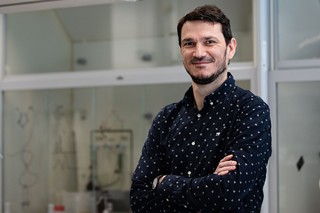Chemical processes are essential for a wide range of industrial value chains, and ensure new product developments and innovations. However, in the light of global challenges in the field of climate protection, energy and resource efficiency, chemical processes must increasingly become independent of fossil raw materials and fuels, and be integrated into concepts for circular economies and greenhouse-gas-neutral material and energy conversion.
Besides increasing product quality, safety and cost-effectiveness, our central goals in the development, design and optimization of chemical processes therefore also include the sustainability of the products and their manufacturing processes. At Fraunhofer ICT, we meet these requirements by developing modern synthesis and process technologies that follow the principles of green chemistry, including energy-efficient and resource-saving process management, minimized waste streams, the recycling of material flows and the use of renewable raw material sources from the outset.
In our development work, we often bring about a paradigm shift from discontinuous to continuous processing techniques. For example, continuous processing involving micro-structured equipment plays a key role in process design and intensification. It allows safe process control in new processing windows, e.g. at higher temperatures, pressures and concentrations, as well as shorter reaction times. These process parameters are difficult or impossible to achieve in classical processes, and can consequently only be optimized technically and economically within continuous processes. We also systematically transfer continuous process control to other process steps and new fields of application. These include in particular the intensification of downstream processing for extractive purification under different pressure regimes, for the size-controlled production of nanoparticles and microcapsules, the development of environmentally-friendly catalytic processes and electrochemical syntheses, and the intensification of multiphase reaction processes.
We are making significant progress in the development and adaptation of fast spectroscopic and calorimetric process analyses, which can be used to monitor the dynamics of chemical processes with a high temporal and spatial resolution. Recent examples include reaction calorimetric tracking of continuous processes along the flow direction or fast infrared spectroscopic tracking of syntheses in IR-absorbing solvents using quantum cascade lasers. The techniques often yield kinetic, mechanistic and safety-related data for optimized process design.
The rapid availability of comprehensive process analytical data not only enables process development times to be significantly shortened, but also allows the increasing application of these data in the digitalization of chemical reaction processes. All process developments are evaluated in economic terms – in particular downstream processes to purify the end products. Life-cycle analyses (LCAs) are carried out, which take account of both cost effectiveness and environmental and health issues.
 Fraunhofer Institute for Chemical Technology ICT
Fraunhofer Institute for Chemical Technology ICT

